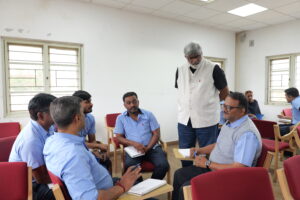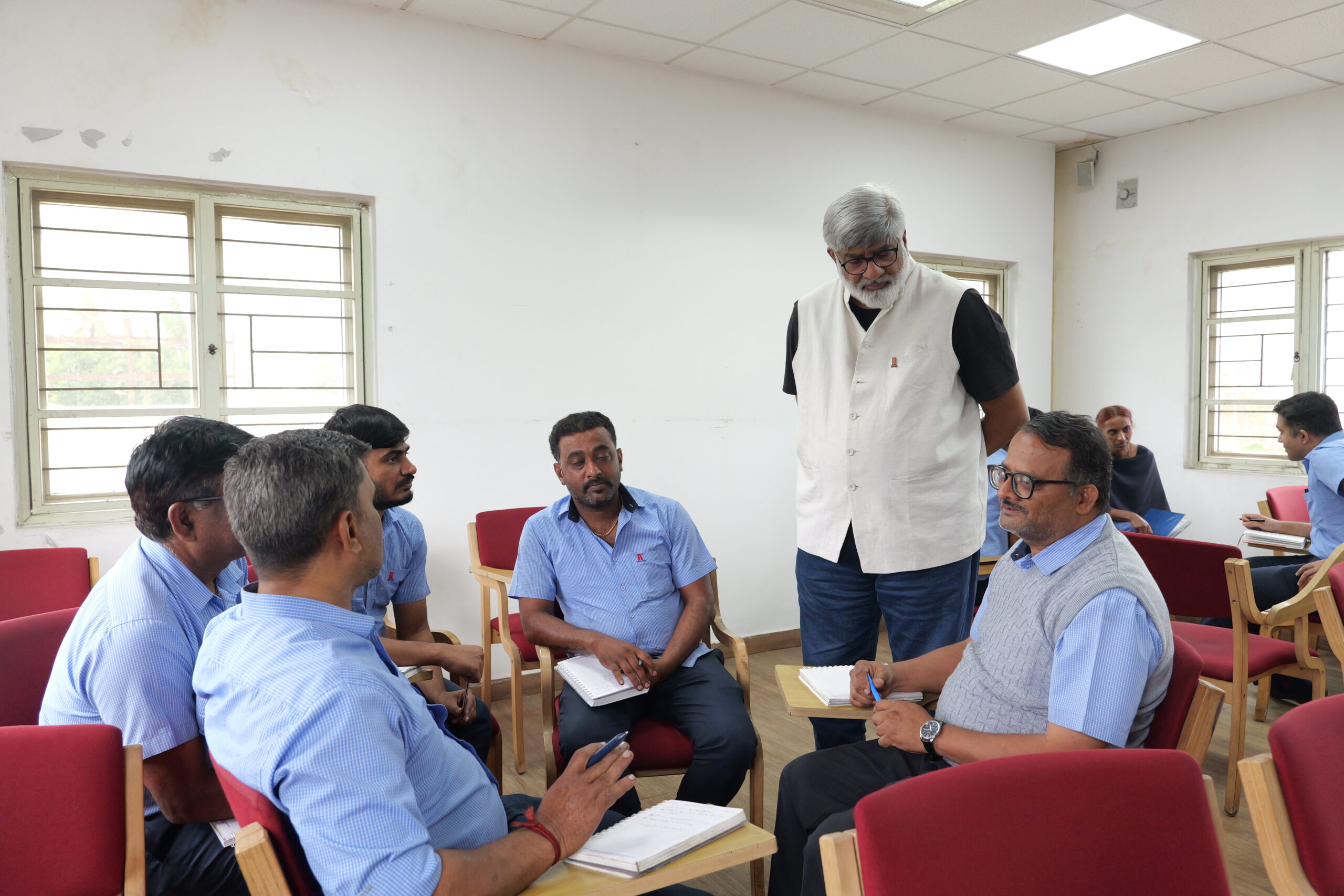By Ramkumar Seshu, Author of Born to Win & Leadership Lessons from the Bhagavad Gita
I LOOK FORWARD TO TALK TO YOU. CLICK THIS LINK
You know, after 43 years of helping people help themselves, I’ve witnessed something beautiful: the leaders who create the happiest workplaces are the same ones who navigate uncertainty with the greatest success. It’s not a coincidence—it’s a fundamental truth about human nature and organizational resilience.

Change isn’t coming—it’s here, and it’s accelerating. A 2024 study by the Adecco Group found that 66% of executives face unprecedented disruption from AI and digital transformation, yet most feel unprepared to lead through it¹. But here’s what excites me: the organizations that embrace uncertainty aren’t just surviving—they’re creating workplaces where people are genuinely happy to contribute their best work.
The Stakes Are Higher Than You Think (And So Are the Rewards)
Let me share something that might surprise you about the cost of inflexible leadership. Research shows that leaders and managers are 56% more likely to experience extensive disruptive change than individual contributors², yet many are still approaching these challenges with outdated mindsets that create unhappy, stressed workplaces.
When leaders resist adaptability, the human cost is profound. I have observed that employees who experienced significant disruption and trusted their leadership, were more likely to be engaged and less likely to feel burned out at work. Think about that—the difference between a happy, engaged team and a burned-out one often comes down to how leaders handle uncertainty.
I’ve seen this pattern repeatedly in my work with organizations across India and beyond. Companies with rigid leaders don’t just lose money—they lose the joy and energy that makes work meaningful. But when leaders embrace adaptability with happiness and confidence, something magical happens.
The Beautiful Truth About Happy, Adaptable Workplaces
Here’s what research confirms and what we’ve seen at Born To Win time and again: happy workers are 13% more productive³, but more importantly, they approach change with curiosity rather than fear. When you combine workplace happiness with adaptive leadership, you create organizations that don’t just weather storms—they find opportunities for growth and joy even in the most challenging times.
Consider this powerful example from one of our “Born to Win – Winning to Lead” clients. Gowri, the HR head of an Telecom services company in Bangalore, faced what seemed like an insurmountable challenge when a major client suddenly changed their technology requirements, affecting their business. Traditional thinking would suggest cutting costs, downsizing, or playing it safe.
Instead, Gowri advised the company to choose the path of adaptive happiness. She gathered her leadership team and asked a question that transformed everything: “What if this disruption is exactly the opportunity we’ve been waiting for to become the company we’ve always dreamed of being?”
She implemented what we call the “I Can, You Can, We Can” approach to uncertainty. First, We helped her leaders develop the “I Can” mindset—the belief that they personally could adapt and find creative solutions. Then, we fostered the “You Can” support systems where team members encouraged each other through the transition. Finally, they built “We Can” collective confidence that the entire organization could emerge stronger and happier.
The result? Within six months, they had developed new service offerings that not only replaced the lost revenue but increased it. More importantly, employee happiness scores increased during what could have been the most stressful period in the company’s history. Teams started volunteering for challenging projects, innovation flourished, and the workplace became known in their industry as a place where people genuinely loved to work.
Why Some Leaders Thrive While Others Struggle
The difference between leaders who create happy, resilient organizations and those who struggle isn’t about intelligence or experience—it’s about mindset. Trust in leadership and effective communication are the two aspects that make the most significant difference in how people feel about change.
But here’s what some leadership experts miss: trust and communication isn’t just about competence—they’re about creating emotional connections that make people feel valued, heard, and genuinely cared for. When people feel happy and supported, they don’t resist change—they embrace it as an adventure.
Let me tell you about an executive in a manufacturing company in Mysore, who attended our “Born to Win – Inspire & Win” program. His factory was facing pressure from automation and global competition. Traditional thinking was to reduce costs and creating environments of fear and uncertainty.
We advised them to take a different approach. We started each week with what we called “Happiness Share”—sessions where individuals would share not just problems, but opportunities they saw emerging from industry changes. We helped them focus on innovation, where employees could experiment with new processes without fear of failure. Most importantly, they celebrated learning from setbacks as much as they celebrated successes.
The transformation was remarkable. Within a year, their facility had developed three process innovations that improved efficiency. Employee happiness increased, and the facility became a case study for happy workplace transformation in the manufacturing sector. They later told me, “When you help people find happiness in change, they stop fearing the future and start creating it.”
The Science Behind Happy Adaptability
Workplace happiness is essential for economic success and productivity, with companies that prioritize employee wellbeing seeing stronger bottom lines and workforces that are motivated, loyal, and better equipped to face future challenges.
But the connection goes deeper. Research shows that experiencing positive emotions on a regular basis improves mental health, reduces stress, and enhances resilience, teamwork, creativity, and problem-solving abilities4. When leaders create cultures of happiness, they’re not just improving morale—they’re building the psychological foundation that makes adaptability possible.
This is why at Born To Win, we don’t separate happiness from performance or adaptability from joy. They’re interconnected aspects of thriving organizations. When people are genuinely happy at work, they have the emotional resilience to handle uncertainty. When they feel supported and valued, they’re willing to take the creative risks that innovation requires.
Your Journey Starts Here
As we conclude, I want you to consider this: the leaders who will thrive in the coming years aren’t necessarily the smartest or most experienced—they’re the ones who understand that creating happy, adaptable workplaces is the ultimate competitive advantage.
For now, I challenge you to start with one simple practice: this week, when challenges arise, ask yourself and your team, “How can we approach this change in a way that brings out the best in our people and creates genuine excitement about our future?”
Remember, at Born To Win, we believe that the best leaders don’t just manage change—they help people discover happiness in the process of growth and transformation. Because when your people are happy, they don’t just adapt to change—they create the future with joy and confidence.
Ready to build adaptive happiness in your organization? Connect with Born to Win today at : https://borntowin.co.in/contact-us/
References:
- Adecco Group. (2024). Leading through the great disruption 2024. Retrieved from https://www.adeccogroup.com/our-group/media/press-releases/leading-through-the-great-disruption-2024
- Gallup. (2024). Disruptive Change Is Hitting Leaders and Managers Hardest. Retrieved from https://www.gallup.com/workplace/645152/disruptive-change-hitting-leaders-managers-hardest.aspx
- University of Oxford. (2019). Happy workers are 13% more productive. Retrieved from https://www.ox.ac.uk/news/2019-10-24-happy-workers-are-13-more-productive
- Penn LPS Online. (n.d.). The science of happiness at work: How positive psychology can increase productivity. Retrieved from https://lpsonline.sas.upenn.edu/features/science-happiness-work-how-positive-psychology-can-increase-productivity



